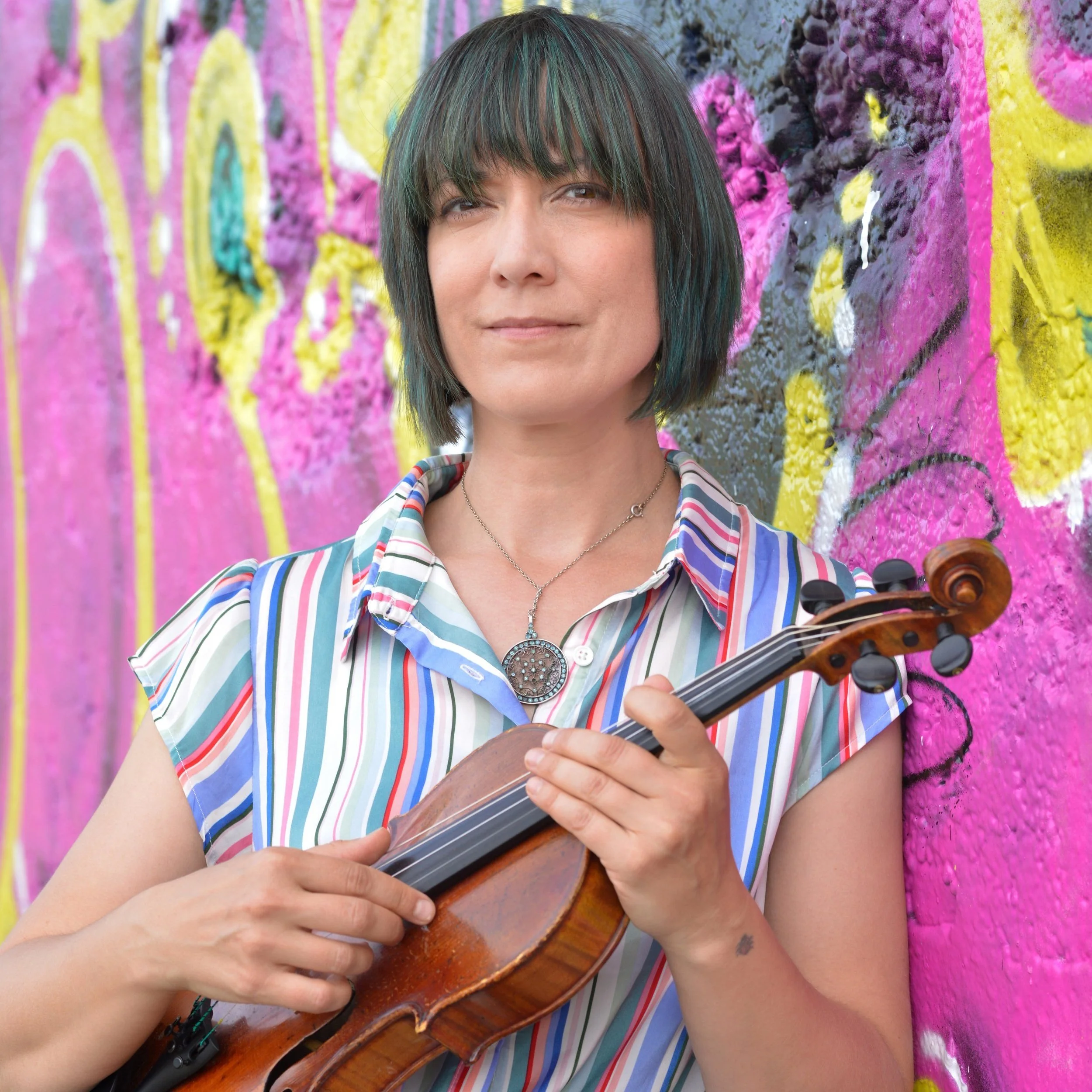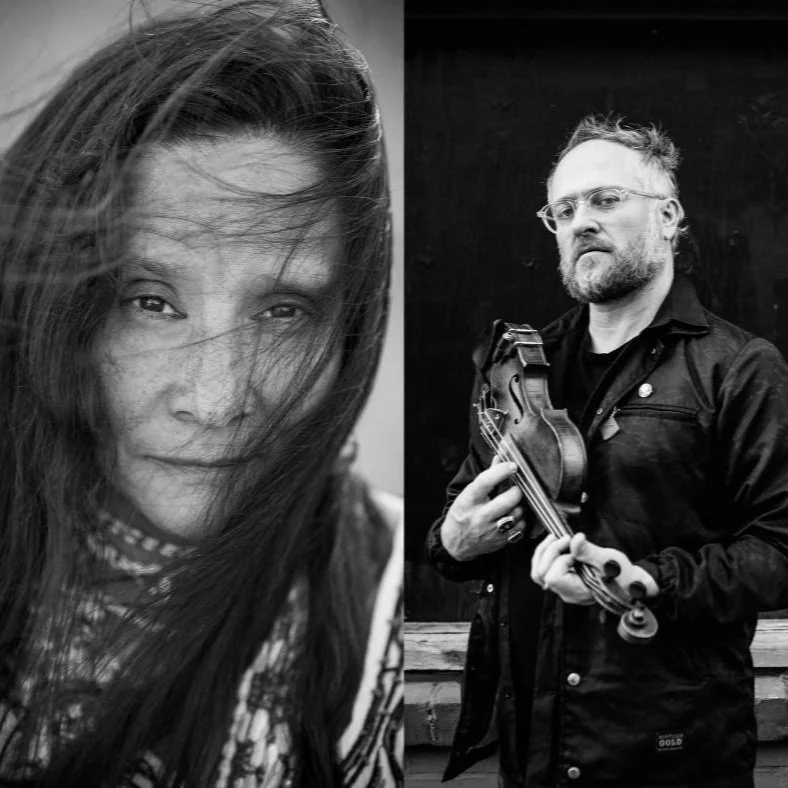Improvisation-driven West Coast String Summit thrives on interdisciplinary interaction
Featuring artists from Laura Ortman to Jesse Zubot and Pura Fé, Improvised Arts Society event spans cello looping, crocheting with music, and an Indigenous banquet
Meredith Bates. Photo by Melvin Yap
Laura Ortman. Photo by Frank Schramm, Montclair Museum of Art
Pura Fé and Jesse Zubot revisit their Chamber of Bones project.
The West Coast String Summit takes place at Ironworks on May 25 and at 8EAST on May 26, presented by Vancouver Improvised Arts Society, in partnership with Vancouver New Music, The Only Animal Theatre Company, KW Studios, and NOW Society
YES, IT IS a music festival, and specifically a music festival that focuses on the creative use of the violin. viola, cello, and upright bass. But there’s a lot more on offer at the 2024 edition of the West Coast String Summit than sound alone, and that’s entirely in keeping with the ethos of its Vancouver Improvised Arts Society presenters.
Launched in 2020 by violinist Meredith Bates and now run by a board that also includes Elisa Thorn, Ruby Singh, Joel DeStefano, Robyn Jacob, Kristin Fung, and Tara Flynn, the society’s primary aim is to serve as a resource for improvising musicians. But, as Bates readily points out, there are other local organizations with a similar mandate.
“What differentiates us is the interdisciplinary work,” she explains. “We always program many disciplines on one program, and they’re usually working together. Like, interacting somehow. So what’s inspiring to me is improvising to moving images, or interacting with a dance artist, or seeing how the mediums communicate with each other.
“It came out of a project called Listen Listen, which was a personal project for me where we had a bunch of funding to hold process-based research sessions to examine the similarities between the language used to instruct dancers, visual artists, and musicians,” she continues. “When we sit down and talk about improvised music, we talk about form and structure and reacting and stimuli and listening….And it’s interesting, because I’ve gotten to know a lot of dance artists through my work and they speak in the same terms. But then we would sit down and it would turn out that, actually, ‘dynamics’ implies something completely different to a dance artist than it does to a musician. ‘Phrasing’ means something completely different to a dance artist than it does to a musician. ‘Composition’ means something different for visual artists than it does for dancers or musicians. And this, to me, was really interesting, so we got together with a lot of really great local artists and had these great, day-long and sometimes multi-day-long sessions where we would do an equal amount of discussing and then improvising together, talking about the similarities and then the differences between our disciplines. That was kind of fun.”
Marina Hasselberg. Photo by Diane Smithers
Those conversations continue via various one-off events and the annual Listen Listen festival, but the West Coast String Summit—programmed by violin and viola player Josh Zubot with input from Bates and the VIA board—is at least somewhat more performance-oriented. Or at least it will be on Day One, which takes place at the Ironworks and includes singer-guitarist Pura Fé and violinist Jesse Zubot’s Chamber of Bones project, which grew out of their work with Wayne Lavalee on the score for Marie Clements’s film Bones of Crows; improvising cellist Marina Hasselberg extending her reach through looping and other electronics; and Brooklyn-based Laura Ortman exploring the connections between avant-garde music and her Apache heritage.
Before that, however, the Improvising Arts Society and The Only Animal artistic director Barbara Adler will collaborate on Slow Social #4, part of an ongoing series in which audience-participation craft activities, including crocheting, link up with improvised performances. Here, interdisciplinary artists Toni-Leah C. Yake, Anju Singh, and Julia Ulehla will be on-stage in various capacities; beyond that, who knows what will happen?
For the Summit’s second day, the action moves to 8EAST and gets even less formal. In the afternoon, community sparkplug and erhu virtuoso Lan Tung will lead an improvised-music workshop in the afternoon; to register, contact info@improvisedarts.ca. In the evening, festival performers and invited guests will improvise together as part of a combined concert and wrap party.
It’s clear that the social dimension is as important as the sonic realm here, and to further build on that theme, Bates has one more inducement to offer players and audiences alike.
“The other thing that I feel is super-important, and that we incorporate into all of our events, is food,” she stresses. “That, to me, is interdisciplinary, because I think that experimental food art is kind of an untapped opportunity, I guess. Food, to me, is an art form! So food is really important, because not only do I believe in promoting food sustainability, but also breaking bread together as a community is really, really important.
“I think it’s really important to have an offering of food around,” she adds, “and so this time we’ve hired Denise Sparrow, from Musqueam First Nation, who has a company called Salishan Catering, and she’s going to be providing that.”
Sparrow’s cuisine is rooted in Salish tradition and based on locally foraged ingredients, but also draws on other cultural elements. “There’s grilled vegetables, sea-asparagus fritters, stuffed potatoes, wild celery shoots, toasted-hazelnut-and-goat-cheese lollipops, feta and herb dips, assorted mini-bannocks and crusty bread, and charcuterie!” Bates enthuses. “Parts of her family hunt and process the meat, so there’s lots of charcuterie that’s family-made. And then members of our board are also contributing food from their own homes. I’m going to make some mini-quiches, and others are going to contribute cookies… It’s just going to be a big feast.”
It’s especially appropriate that the String Summit honours its First Nations participants Fé, Ortman, and Yake with an Indigenous banquet, and that it’s going beyond the usual land acknowledgement to offer Coast Salish people a literal seat at the table.
“I think really deeply about that stuff, and I worry about it a lot,” Bates says. “Like, ‘How can we do this to the best of our ability?’ It’s all about hosting: I want people to feel comfortable and to feel welcome, and it’s not even my land to welcome people to. But in hosting this event, I feel like there’s a responsibility for Josh and I to speak to our relationship to the land, and honour the First Nations that are stewarding the land.
“I hope it helps people to settle themselves in the space and feel comfortable and at home,” she adds, “so that we can listen as a community.” ![]()

















